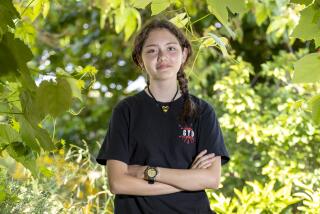Neville Browne sees great future in plastic bottle recycling
The gig: Neville Browne, 67, is president and chief operating officer of CarbonLite Recycling in Century City. In that role, he has a hand in overseeing the largest plastic bottle recycling plant in the U.S., in Riverside County. At 220,000 square feet, and with $50 million in machinery and equipment, the facility has the capacity to recycle 100 million pounds of used plastic bottles a year. The plant employs 130 people, producing food-grade post-consumer recycled polyethylene terephthalate, or PET pellets.
Bottles become bottles: “Bails of dirty bottles come in. We initially wash the whole bottle,” Browne said. “We then chop it up into corn-flake-like material. We then intensively wash those corn flakes. Then we dry it and put it into reactors where we reduce it to a molten state. We extrude it like spaghetti, then chop it up into smaller pieces that look like rice. Those little pellets are what gets resold to PepsiCo. and Nestle Waters North America, and they use them to make new bottles.”
Career inspiration: Yes, it was the 1967 movie “The Graduate.” One of the movie’s minor characters, McGuire, gave Browne direction with career advice intended for the film’s protagonist, played by Dustin Hoffman. “Plastics.... There is a great future in plastics. Think about it.” Browne was a young man living in Sydney, Australia, who couldn’t afford college and jumped at the idea. “I looked through the newspapers for a job in plastics.” Brown worked initially for plastic bag manufacturers in Australia and Singapore. In 1980, he came to the U.S. to start his own company, in the city of Bell, that made plastic trash bags. California was the place to be, Browne said. “It was the best of all worlds then. It had wonderful infrastructure and a wonderful labor force.”
A fateful lawsuit: Browne named his company Hilinex. He was sued within nine weeks of his arrival for copyright infringement by a rival trash bag maker named Hilex. “I just wanted to make trash bags, so I didn’t fight it. I changed our name to Himolene Inc.,” Browne said. About 18 months later, at a business conference in Texas, a man named Leon Farahnik introduced himself. “He said, ‘Hi, I’m the guy who sued you.’ We shook hands and have been best friends ever since.”
Winds of change: In 1987, the nation, including Browne, was transfixed by the barge from New York that traveled for 162 days and 6,000 miles, searching in vain for a place to offload 3,000 tons of garbage. “That was the beginning of a big turning point,” Browne said. “We cannot keep using stuff once and throwing it away because it is piling up and we don’t know where to put it.” Two years later, Browne sold Himolene to First Brands Corp., maker of Glad bags, for enough money to move back to Australia, buy a farm and live in semi-retirement. For the next five years, he traveled extensively, but the idea of recycling never left his mind.
Inspiration: “Cradle to Cradle: Remaking the Way We Make Things,” a 2002 book by William McDonough and Michael Braungart, preached the concept of “eco-effectiveness,” that using something once isn’t enough. That became a mainstay of Browne’s beliefs. “It’s far better to rescue old bottles and use them to make new bottles,” Browne said.
Three years later, in 2005, Browne’s old friend, Farahnik, invited him to a major plastics conference in Germany, where he saw how much the industry was moving in the direction of recycling. Browne urged his friend to do the same. “There was an underlying theme. We’re not going to be allowed to keep making things people use for maybe 10 seconds and then just throw it away,” Browne recalled. “We’ve got to have an answer. Scavenge it, recover it and make new products out of it.”
Over the next few years, Browne and Farahnik talked extensively about new business ventures. In 2010, Farahnik founded CarbonLite, becoming its chairman and chief executive, and brought Browne on board to help him run it.
Best advice: “Be reliable. You don’t need a college degree,” Browne said. “You don’t even need high intelligence. The one thing you need, and you will not succeed without it, is reliability.” In addition, he said, seek out successful people for career advice. “Ask them what they would do. I certainly wouldn’t recommend the way I did it, which was watching a movie.”
Personal: Browne lives in Los Angeles with his wife, Tina, and his three young daughters — Alyla, Xanthe and Aviva. “I live vicariously through my daughters. My only hobby is attending wonderful kids’ birthday parties.”
Twitter: @RonDWhite
More to Read
Inside the business of entertainment
The Wide Shot brings you news, analysis and insights on everything from streaming wars to production — and what it all means for the future.
You may occasionally receive promotional content from the Los Angeles Times.










